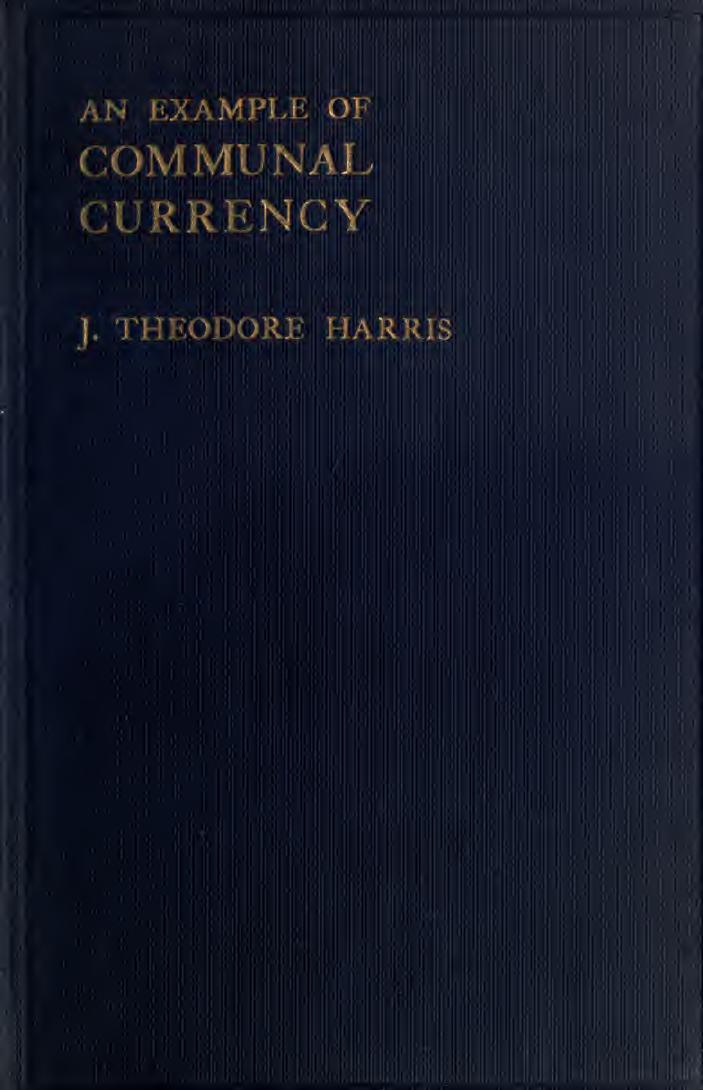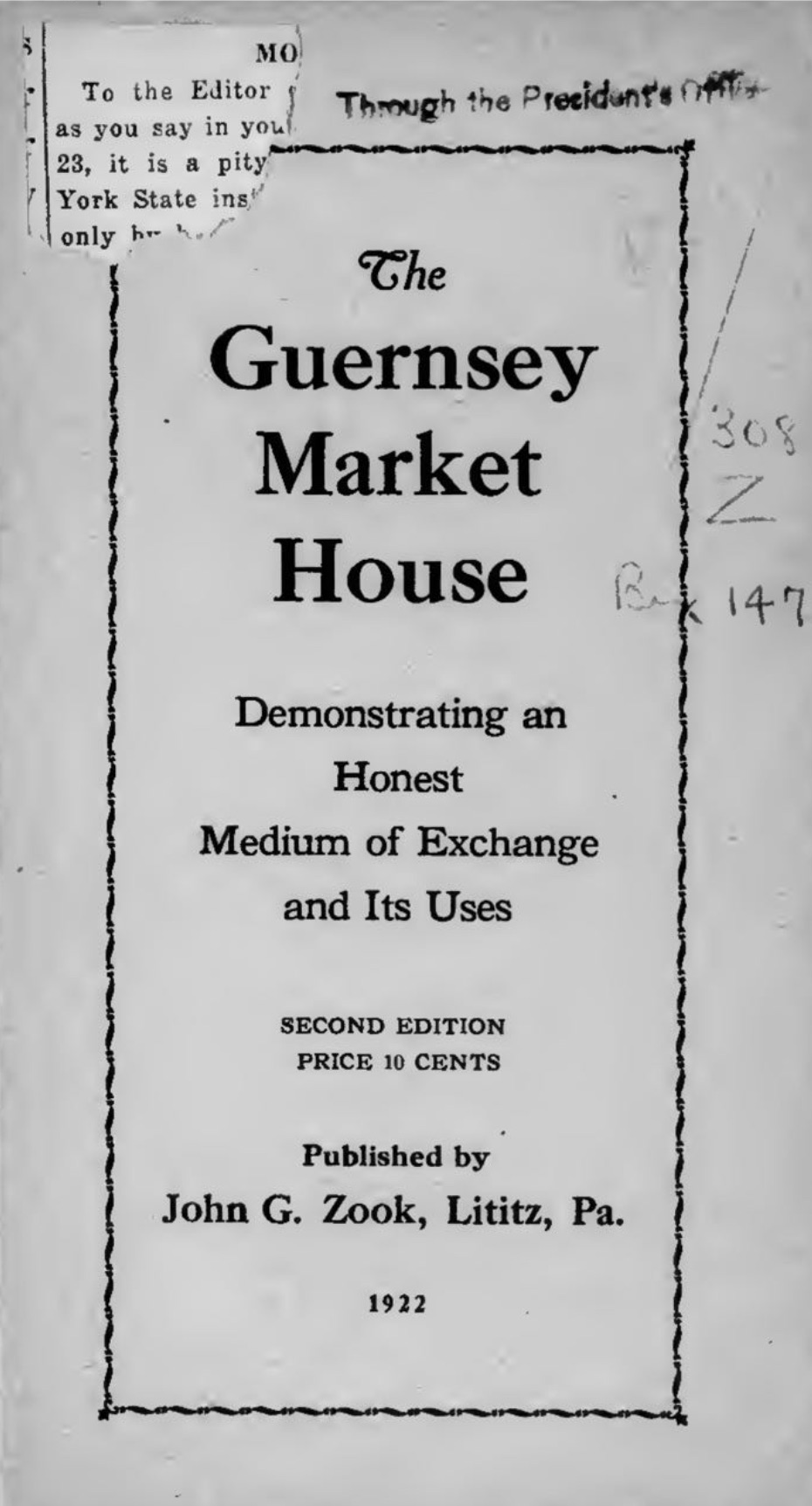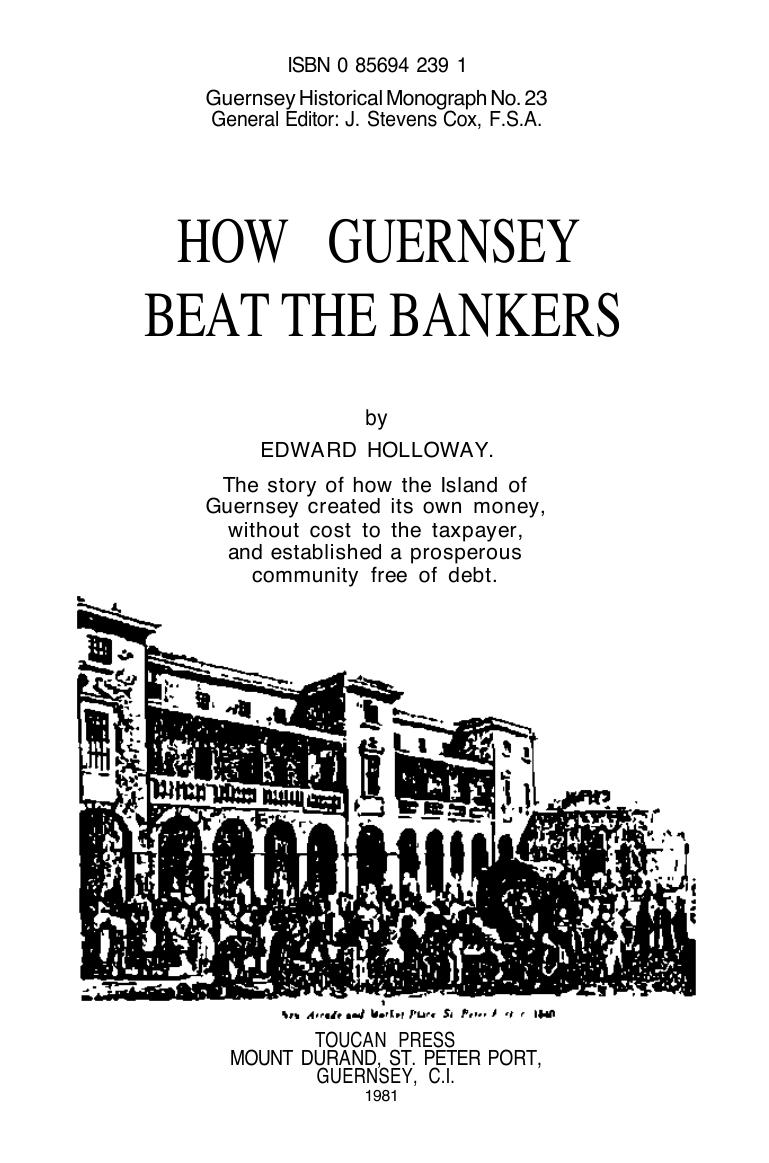The Guernsey Monetary Experiment
In the 19th century the British island of Guernsey carried out an experiment in creating and distributing its own local currency to support local projects without going to the usurious banking system for funding. This is the story in a collection of short books and pamphlets about it and an audio recording.
- The Guernsey Experiment talk by Matthew J. Browning (13 minutes, 45 seconds)
- The Guernsey Market House Plan of Payments (1897) by Albert Kimsey Owen
- An Example of Communal Currency - The Facts About the Guernsey Market House (1911) by Joseph Theodore Harris
- The Guernsey Market House - Demonstrating an Honest Medium of Exchange and Its Uses (1922) by John G. Zook
- How Guernsey Beat the Bankers (1981) by Edward Holloway
Matthew J. Browning, The Scottish Monetary Reform Society
The Guernsey Experiment Talk (1983)
- Download 1983 - The Guernsey Experiment - M J Browning.mp3 (30 MB), 13 minutes, 45 seconds.
- Source
(Uploaded by Alexander Baron, (born 1956): "This is from a cassette tape I obtained c1982; I can't remember where I bought it but it was published by the Scottish Monetary Reform Society.")
Albert Kimsey Owen
The Guernsey Market House Plan of Payments (1897)

Excerpt from The Guernsey Market House Plan of Payments
Shakespeare says we are creatures that look before and after. The more surprising that we do not look round a little, and see what is passing under our very eyes. - carlyle.
A hen, which had become blind, continued to scratch for food as she had been used. What availed it, the industrious fool! Another hen that could see, but wished to save her tender feet, never forsook the side of the former, and, without scratching, enjoyed the fruits of scratching; for as often as the blind hen turned up a corn the seeing one devoured it. - lessing.
Look at this locomotive, inspect that steamship, examine the works of this watch. Did the moneyed man make them? No, it is answered, but be caused them to be made. He found the means. His money was the creative power. Be it so. Then labor will make its own money, and the capitalist will no longer be needed - edward kellogg.
Downloads and Links
- Download The Guernsey Market House Plan of Payments (1897) by Albert Kimsey Owen - PDF (16 MB) - 93 pages.
- Read The Guernsey Market House Plan of Payments on The Internet Archive and download in different formats
- Web search for the book by ISBN:9781330923429
- Web search for the book by author and title
Joseph Theodore Harris
An Example of Communal Currency - The Facts About the Guernsey Market House (1911)

From the PREFACE
Those who during the past thirty or forty years have frequented working men's clubs or other centres of discussion in which, here and there, an Owenite survivor or a Chartist veteran was to be found, will often have heard of the Guernsey Market House.Here, it would be explained, was a building provided by the Guernsey community for its own uses, without borrowing, without any toll of interest, and, indeed, without cost. To many a humble disputant the Guernsey Market House seemed, in some mysterious way, to have been exempt from that servitude to previously accumulated capital in which the whole creation groaneth and travaileth. By the simple expedient of paying for the work in Government notes issued to the purveyors of material, the master-workmen and the operatives, accepted as currency throughout the island, and eventually redeemed out of the annual market revenues—all tribute to the capitalist was avoided.
Downloads and Links
- Download An Example of Communal Currency - The Facts About the Guernsey Market House (1911) by Joseph Theodore Harris & Sidney Webb - PDF (27 MB) - 104 pages.
- Read An Example of Communal Currency - The Facts About the Guernsey Market House on The Internet Archive and download in different formats
- Web search for the book by ISBN:2940019735013
- Web search for the book by author and title
John G. Zook
The Guernsey Market House - Demonstrating an Honest Medium of Exchange and Its Uses (1922)

OUR present money system is not only unscientific but unjust to such a degree that it is becoming intolerable. Our government instead of exercising its constitutional duty to “coin money and regulate the value thereof" has turned the money business over to a privileged class who with every turn of the legislative thumbscrew are making the exploitation of the wealth producers more secure. When through the cornering of money not only millionaires but billionaires appear it is time to call a halt. Our monied institutions are drawing interest on five times as much money as there is in existence and thus usury accumulates all the wealth in a few hands.
Downloads and Links
- Download The Guernsey Market House - Demonstrating an Honest Medium of Exchange and Its Uses (1922) by John G. Zook - PDF (4.8 MB) - 26 pages.
- Read The Guernsey Market House - Demonstrating an Honest Medium of Exchange and Its Uses on The Internet Archive and download in different formats
- Web search for the book by author and title
Edward Holloway
How Guernsey Beat the Bankers (1981)
1958, reprinted 1981 Guernsey Historical Monograph No. 23

From The PREFACE by James Glyn Ford
This pamphlet, "How Guernsey Beat the Bankers", is a reprint of one issued in 1958 by the Social Credit Movement. It tells how the Guernsey States from 1819- 1836 manipulated the issue of notes to allow a number of public works to be carried out — including both the construction of the Guernsey Market and the rebuilding of Elizabeth College — without increasing public debt. The details are contained within the pamphlet itself. The author, rightly, saw this as an anticipation of the idea of social credit. As such, for the very different audience that will read it now, a very brief background to the ideas and history of the Social Credit Movement in Britain may prove helpful.The Movement's origins lay with the economic theories of Major C.H. Douglas, who early this century wrote a number of books explaining that the then current economic problems were caused by the arbitrary control of the money supply by the banks and bankers. He proposed that money backed by gold or paper should be replaced by notes backed by the real wealth of nations, their goods, plant and machinery. A consequence of this would be that the parasitic role of bankers in the economy would be removed and the economy would as a result expand.
Downloads and Links
- Download How Guernsey Beat the Bankers (1981) by Edward Holloway - PDF (75 kB) - 11 pages.
- Read How Guernsey Beat the Bankers on The Internet Archive and download in different formats
- Web search for the book by ISBN:856942391
- Web search for the book by author and title
